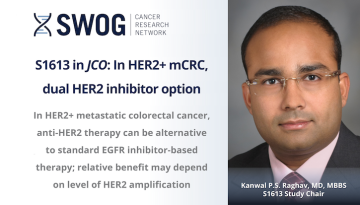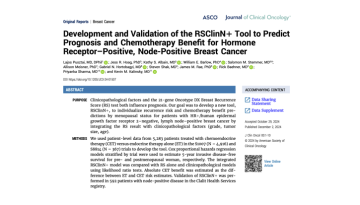The White House Tackles Clinical Trials
Last week I attended the White House Clinical Trials Forum, hosted by the Office of Science and Technology Policy. Another NCTN group chair also attended – my ECOG-ACRIN colleague and good friend Dr. Peter J. O'Dwyer.
The forum was aimed at enhancing access to trials, lowering participation barriers, and strengthening the country’s clinical trials infrastructure. After opening plenary panels on people-centered trial innovation and improving trial access (you can watch these on YouTube), we moved to four breakout sessions.
I was in the “innovative strategies for national clinical trials readiness” breakout, with a range of experts from oncology and, interestingly other fields like infectious disease, along with research supporters from a variety of areas, sharing best practices. We identified a number of problems, discussed potential solutions, and left very much energized and optimistic.
I’ll let you know when next steps are determined, but for now I want to share what I learned about a number of exciting initiatives and opportunities.
Communities Advancing Research Equity for Health (CARE for Health)
National Institutes of Health Director Dr. Monica Bertagnolli discussed this new NIH program. After noting that citizens who face overall poorer health outcomes are also generally underrepresented in research, she outlined a vision of a network to conduct clinical research in primary care venues.
The CARE for Health program will build an infrastructure to integrate research into real-world settings as a route to sustained engagement with communities underrepresented in research, with a goal of conducting research that’s meaningful to those communities.
Dr. Bertagnolli discussed CARE for Health as part of a learning health system, in which data collected routinely in the clinic informs research, and the results of that research in turn inform practice. You can read more in the NIH’s recent press release on their $30 million pilot for the program.
Ensuring a free flow of data across electronic health record (EHR) systems
Dr. Micky Tripathi, the national coordinator for health information technology, spoke about the many EHR systems deployed at clinical sites across the U.S. and the need to easily exchange data between these systems – for access by patients, for continuity of care, and for use in research, including conducting distributed clinical trials and quickly matching patients to appropriate trials.
The office he leads (housed within the Department of Health and Human Services) has helped put in place data standards that have established interoperability across those EHR systems, and they’ve implemented a combination of carrots and sticks to ensure data in those systems is accessible by other authorized parties, including for research purposes.
As Dr. Tripathi put it, his office is ensuring the plumbing is in place that will allow health data to flow, and it sounds like the spigots are now open. This plumbing offers opportunities for patients to be able to access all of their health data in one place, for providers to quickly get the information they need in caring for patients, and for public health agencies and researchers to access and use anonymized health record data in new ways.
FDA draft guidance on diversity action plans
Food and Drug Administration Commissioner Dr. Robert Califf spoke about efforts to make clinical trials more representative and announced that his agency had, just moments earlier, released its updated draft guidance to trial sponsors on what needs to go into a diversity action plan.
Action plans outlining how sponsors will meet criteria for enrolling a representative group of participants will be required primarily for phase 3 studies. The guidance document is now posted to the FDA website, and they invite public comments until September 26th.
Much more transpired during the half-day event (including this photo), but I want to close by bringing this back to patients.
Two speakers, each of whom had enrolled personally onto multiple cancer clinical trials, spoke forcefully of having had to burn through much of their family’s savings to travel around the country to find trials they could participate in. They reminded us that trials are also treatment, and that making our trials more accessible, inclusive, and pragmatic, and making our development processes more nimble, can mean, for many patients, the difference between life and death.
The forum was a very encouraging step toward enhancing the reach and efficacy of federally funded (and perhaps other) research.
Other Recent Stories



